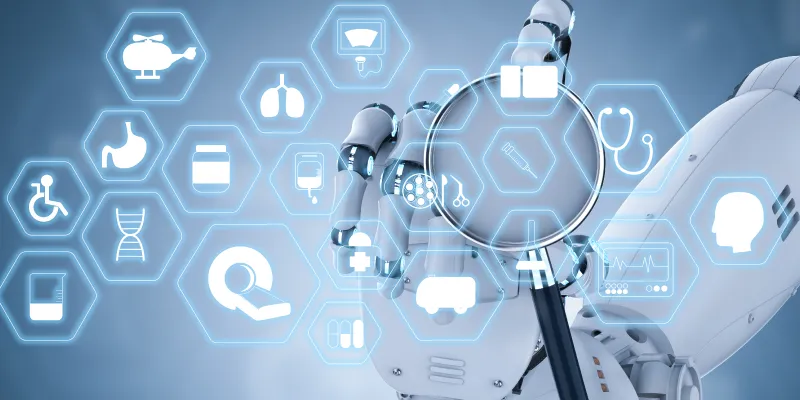The dynamic duo of AI and ML is the change healthcare needs
The domain of healthcare has been craving significant attention for a while now. Artificial Intelligence and Machine Learning are here to give it a makeover.
Undoubtedly, healthcare remains one of the many spaces that demands and delivers innovation at its finest. Mankind’s need to elongate and improve lifespan and lifestyle through the use of technology is at its peak. As these needs expand and diversify, the essence of technology in healthcare itself has seen a plethora of changes.

Core to these changes are two technologies that have taken a firm hold of the tech-space across sectors and have been in the news for a while now – the dynamic duo of artificial intelligence and machine learning.
AI and ML have undoubtedly been hogging the limelight in technology for a while now, and deservedly so.
Considering the sensitive nature of the sector, there’s no denying that the stakes are always high in healthcare. Certain challenges that have plagued the health-tech domain and made progressive strides laborious can be tackled with ease by this dynamic duo.
AI and ML are already tackling healthcare’s biggest challenges
Healthcare has been plagued by a plethora of hurdles ever since the existence of mankind. However, the impact of some hurdles is evidently more prominent over others.
For example, one of the most pathbreaking applications of AI and ML is to enable a better understanding of the structure of DNA and its impact on the human life thereafter. While innovations of the past have already successfully deciphered genome sequencing, we are yet to find a way to keep up with the seemingly countless interactions genes have with dynamic variables introduced into the fray like food intake, body types and structures, impact of environmental conditions and many more.
The relevance of understanding DNA comes from the simple fact that doing so will enable delivery of personalised solutions for each unique individual. Established names like Google (Deep Mind) and IBM (Watson) have already made significant strides in the domain, accomplishing pattern recognition in mere days as opposed to years.
Yet another massive impact comes to the field of drug discovery, formulation and testing. On average, the typical drug-creation and delivery life-cycle averages 11-15 years.
Unfortunately, the high gestation period means incredible complications arise, including the diseases and maladies being targeted evolving off their own accord, long drawn testing phases, mutations and side-effect management.
This makes the process incredibly time-consuming – which is where AI and ML plays a massive role in significantly reducing downtime on drugs, while also keeping costs under budgets. Take the case of Atomwise, a San-Francisco based startup that has simply replaced test tubes with supercomputers in the development process, with results uncovering two entirely new drugs that drastically reduce spread of Ebola infectivity.
Another classic example is how Berg Health, based out of Boston approaches disease differently. BH mines and recovers cured patients’ data using AI and uses this data to modify and create existing and new cures and therapies respectively.
Finally, let us not forget the rapid pace at which diseases mutate and change nature. Disease identification and management is further hindered by the fact that more often than not, existing technology does not provide for meaningful results.
Moreover, the pattern of symptomatic detection we’ve followed as a species might be effective in minor maladies like the flu, but for more serious maladies like cancer, symptomatic detection doesn’t cut it.
Here, machine learning can detect unique patterns and signatures left behind by known designs to detect and identify them well in advance, increasing the odds of survival by as much as 90 percent in most cases.
Freenome based in San-Francisco uses an adaptive genomics engine to detect disease signatures in blood. Others such as Enlitic enable better patient outcomes by marrying ML with medical data across the world to devise effective diagnosis and treatment plans.
The implications in the road ahead
It’s apparent that AI and ML are not to be taken lightly in the healthcare game. The two, especially when used jointly, can solve a wide array of problems for the sector, minor and major.
This means making AI and ML universally accessible and pervasive in the sector is probably the need of the hour.
Companies need to make strides to accommodate for AI and ML application, or perhaps, we could be looking at a new wave of healthcare startups that offer services exclusively mastering the two.
As healthcare continues to grow in both size and depth, technology needs to keep pace with it in order to enable healthcare aficionados and amateurs alike to find innovative ways to enhance quality of life and lifestyle simultaneously. Don’t be surprised if AI and ML are at the very top of this pyramid of new-age health-tech.
(Disclaimer: The views and opinions expressed in this article are those of the author and do not necessarily reflect the views of YourStory.)







